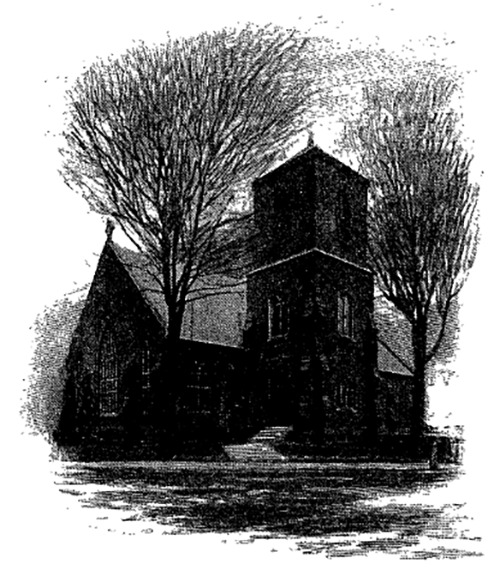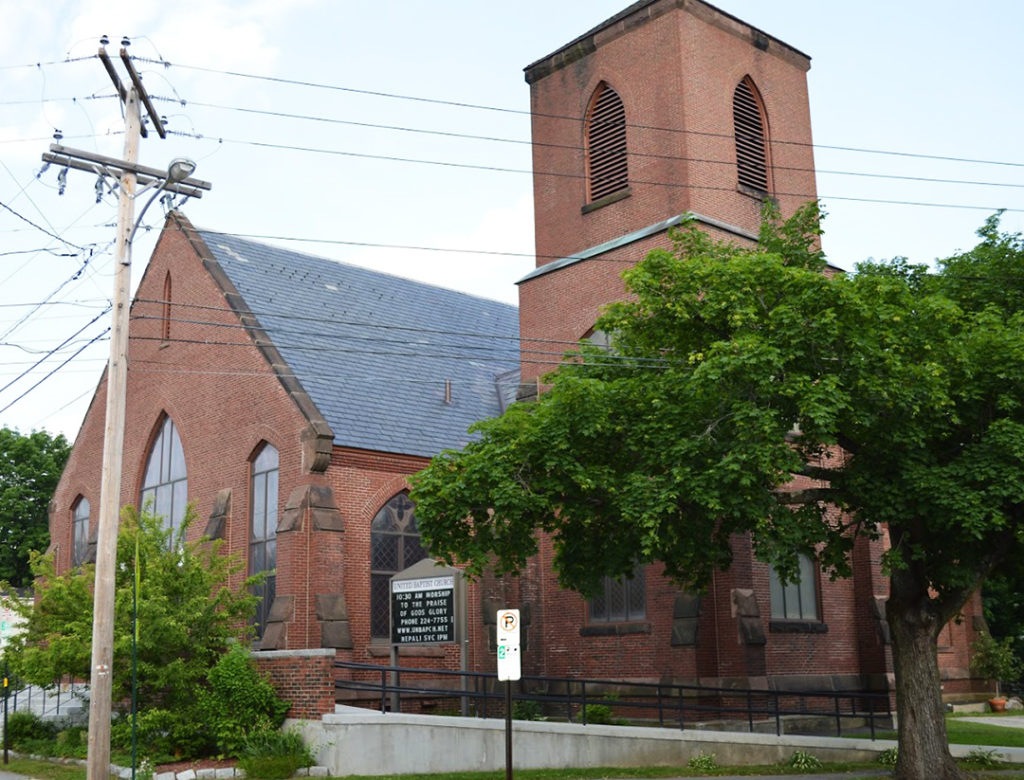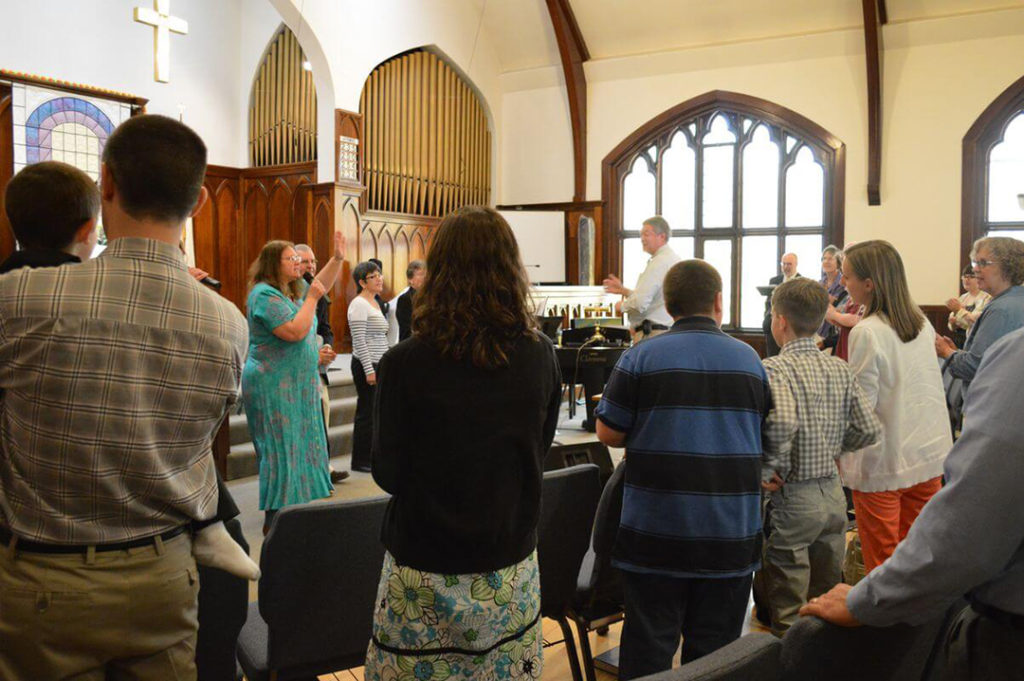The history of the United Baptist Church (UBC) in Concord, New Hampshire, stretches back to 1844. The original building still stands. Then in 1962, to serve the community even more, they added on an education wing with classrooms and a meeting space.
The United Baptist Church may be one building, but it welcomes four different congregations each week. In fact, on Sundays at 11 am, there are two services – one upstairs and one downstairs – and both also stream simultaneously online.
The church is both a place of worship and a community center. In addition to Sunday services, youth groups and other organizations often meet there throughout the week.
The staff of United Baptist Church includes their pastor, church administrator (who also manages the website), music director (who also produces the Zoom streaming events), and the Church Council. As one of the five members of that Council, Bill Hopkins took on the challenges they faced with their non-profit’s WiFi.

United Baptist Church c. 1844 when it was founded (above) and today

The challenge
The needs of the United Baptist Church are unique in that they have huge spikes of WiFi usage. For 2 hours each week, there are approximately 100 people in the building while they stream services on two floors. And then the usage varies through the rest of the week with staff managing operations, and members of the church coming and going.
In addition, one of Bill’s mandates when setting up their network was to serve the homeless in their community by offering them WiFi. “We serve people,” he said, “and we do what we can to provide better access to folks that don’t otherwise have it.”
When Bill began, the church had one router that they got from their internet service provider. This router, with a built-in access point, was trying to serve their large building, hundreds of church members and staff, and all of their various needs.

“Our former system, which was pretty primitive, would outstrip what could be put out live,” Bill shared. “We ended up with lots of lag, lots of latency issues…lots of issues with the device from the ISP because it just couldn’t handle that amount of data.”
The staff moved the router around to try and make things work. “However, our nodes were too far away from the users,” Bill added. “People tried to install workarounds – they installed cabling all over the building to try and get a router to where they needed it, but it just wasn’t successful.”
The solution
Three months ago, a telecommunications consultant gave Bill a recommendation for Meraki Go. He suggested the solution based on his vast experience, including the complaints and issues he’s dealt with from other brands. In contrast, he knew that Meraki Go was really accessible for anyone and simple to set up. He told Bill, “Meraki Go is going to be your easiest solution for what you want to do.”
Bill added, “And I’m here to tell you that that was correct.”
He ordered two 8-port switches, a Router Firewall, and five indoor access points. “Once I installed the app on my phone, got things unboxed, and followed some pretty simple instructions,” he recalled, “I got my network up and running in less than an hour.” Bill then set up a password to protect their network, which he only shares with their community when they ask for it.
“Anybody who operates a public network needs [Meraki Go]. And I also think that it’s valuable for home use, too.”
Bill Hopkins
Since setting up the network, it has been running so flawlessly that troubleshooting hasn’t even been needed. Bill still checks on the health of his network once a day and is able to do that from anywhere. “With the app on my phone, I can learn anything I want.”
Bill also checks on their data usage every couple of days to help him better understand who is using the network and how they are using it. For example, he discovered that someone was using their network to stream videos. Meraki Go gives them the ability to block apps like Netflix and YouTube that hog a lot of bandwidth.
But what really surprised and delighted Bill was all the Guest Insights that Meraki Go gives their non-profit and can give to business owners. “It has helped me identify who comes through the door, who uses the network, and guest traffic stats.” They can see how often someone visits the building, whether it was last week or last month. The United Baptist Church now has all this data to use to create programs around that loyalty.
“It blew me away,” Bill said. Meraki Go gave him insights he didn’t even know were possible.
Final thoughts
Thanks to Meraki Go, United Baptist Church now has fast, secure, and reliable WiFi for their non-profit organization. Even considering some anticipated growth, Bill thinks he will be able to keep the current network setup for 5 years. And then, if needed, he knows he can simply supplement his system with different Meraki Go devices.
“I’ve got to tell you, I was impressed with everything that came out of the box,” Bill enthused.
He wasn’t the only one impressed with Meraki Go. The entire United Baptist Church community is now able to enjoy connectivity and streaming services without any interruptions. The staff can conduct secure operations online and has insights into the people who visit their church.
In addition, stories of the church’s success have impressed other business owners. “I’ve spoken with a lot of businesses and they said, ‘You were able to do that, Bill?! You’re not a technician.’”
“It met my needs, and I suspect that there are folks with other similar needs,” Bill believes. “It may not be a church, but other small business owners, cafe owners…anybody who operates a public network needs [Meraki Go]. And I also think that it’s valuable for home use, too.”






